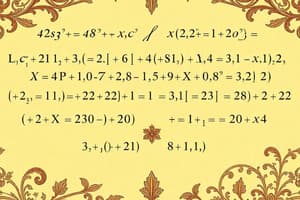Podcast
Questions and Answers
Which of the following is the standard form of a quadratic equation?
Which of the following is the standard form of a quadratic equation?
- ax^2 + bx + c = 0 (correct)
- x^2 + bx + c = 0
- x^2 + ax + b = 0
- ax^2 + bx + c = 1
What is the formula to find the roots of a quadratic equation?
What is the formula to find the roots of a quadratic equation?
- x = (b ± √(b^2 - 4ac)) / 2a
- x = (-b ∓ √(b^2 + 4ac)) / 2a
- x = (-b ± √(b^2 - 4ac)) / 2a (correct)
- x = (b ∓ √(b^2 + 4ac)) / 2a
What is the discriminant of a quadratic equation used for?
What is the discriminant of a quadratic equation used for?
- To simplify the equation
- To factorize the equation
- To determine the number and nature of the solutions (correct)
- To find the vertex of the parabola
Flashcards are hidden until you start studying
Study Notes
Quadratic Equation
- The standard form of a quadratic equation is ax^2 + bx + c = 0, where a, b, and c are constants, and a ≠ 0.
Roots of a Quadratic Equation
- The formula to find the roots of a quadratic equation is x = (-b ± √(b^2 - 4ac)) / 2a.
Discriminant of a Quadratic Equation
- The discriminant of a quadratic equation is b^2 - 4ac, and it is used to determine the nature of the roots:
- If the discriminant is greater than 0, the roots are real and distinct.
- If the discriminant is equal to 0, the roots are real and identical.
- If the discriminant is less than 0, the roots are complex and distinct.
Studying That Suits You
Use AI to generate personalized quizzes and flashcards to suit your learning preferences.



